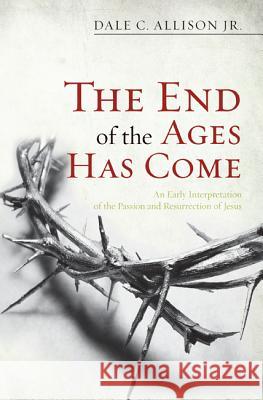The End of the Ages Has Come: An Early Interpretation of the Passion and Resurrection of Jesus » książka
The End of the Ages Has Come: An Early Interpretation of the Passion and Resurrection of Jesus
ISBN-13: 9781625643872 / Angielski / Miękka / 2013 / 194 str.
The End of the Ages Has Come: An Early Interpretation of the Passion and Resurrection of Jesus
ISBN-13: 9781625643872 / Angielski / Miękka / 2013 / 194 str.
(netto: 108,60 VAT: 5%)
Najniższa cena z 30 dni: 113,72
ok. 16-18 dni roboczych
Dostawa w 2026 r.
Darmowa dostawa!
Description: How does one explain the New Testament texts that seem to announce the imminent arrival of the long-awaited Day of the Lord? In this study, Dale Allison presents a comprehensive analysis of the first-century beliefs about the period of suffering and tribulation which was to precede the general resurrection of the dead. Although such beliefs were not uncommon, they heave received little attention from New Testament scholars. Dr. Allison argues that they provided the conceptual tools that allowed New Testament writers to make sense of the death and resurrection of Jesus, without abandoning altogether Jesus' own messianic expectations and belief in some imminent radical change. Dr. Allison shows that the realized eschatology of the Gospels is not, as is so often thought, the product of Jesus' own teaching and preaching. Rather, it stems from the reflection of the earliest Christian communities on the death of Jesus, in the light of his belief in a imminent End. Dr. Allison offers a stimulating and detailed account of the teaching of Jesus and of the New Testament records of the passion and resurrection of Jesus. He concludes his study with an important discussion of the way this process of reflection has continued throughout Christian history and indeed how it continues to influence Christian thinking today.
Description:How does one explain the New Testament texts that seem to announce the imminent arrival of the long-awaited Day of the Lord?In this study, Dale Allison presents a comprehensive analysis of the first-century beliefs about the period of suffering and tribulation which was to precede the general resurrection of the dead. Although such beliefs were not uncommon, they heave received little attention from New Testament scholars. Dr. Allison argues that they provided the conceptual tools that allowed New Testament writers to make sense of the death and resurrection of Jesus, without abandoning altogether Jesus own messianic expectations and belief in some imminent radical change. Dr. Allison shows that the realized eschatology of the Gospels is not, as is so often thought, the product of Jesus own teaching and preaching. Rather, it stems from the reflection of the earliest Christian communities on the death of Jesus, in the light of his belief in a imminent End.Dr. Allison offers a stimulating and detailed account of the teaching of Jesus and of the New Testament records of the passion and resurrection of Jesus. He concludes his study with an important discussion of the way this process of reflection has continued throughout Christian history and indeed how it continues to influence Christian thinking today.











